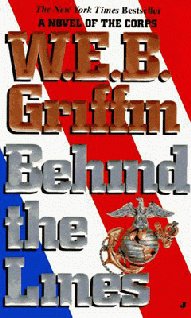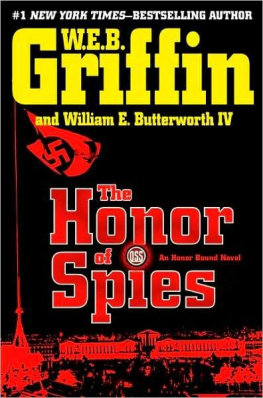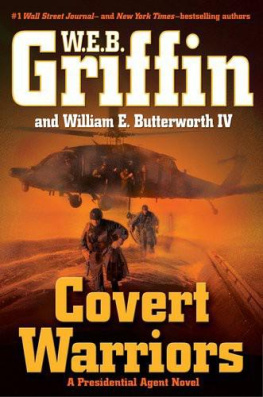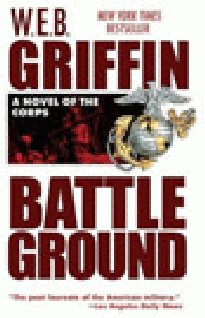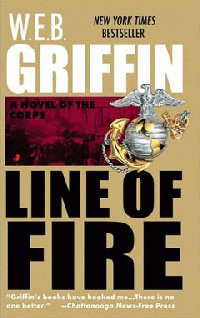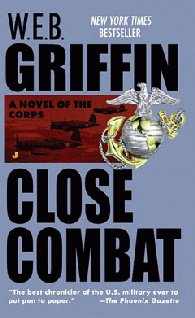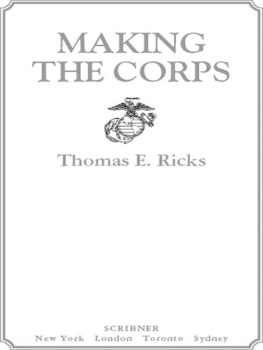W.E.B. Griffin - The Corps VII - Behind the Lines
Here you can read online W.E.B. Griffin - The Corps VII - Behind the Lines full text of the book (entire story) in english for free. Download pdf and epub, get meaning, cover and reviews about this ebook. genre: Prose. Description of the work, (preface) as well as reviews are available. Best literature library LitArk.com created for fans of good reading and offers a wide selection of genres:
Romance novel
Science fiction
Adventure
Detective
Science
History
Home and family
Prose
Art
Politics
Computer
Non-fiction
Religion
Business
Children
Humor
Choose a favorite category and find really read worthwhile books. Enjoy immersion in the world of imagination, feel the emotions of the characters or learn something new for yourself, make an fascinating discovery.
- Book:The Corps VII - Behind the Lines
- Author:
- Genre:
- Rating:3 / 5
- Favourites:Add to favourites
- Your mark:
- 60
- 1
- 2
- 3
- 4
- 5
The Corps VII - Behind the Lines: summary, description and annotation
We offer to read an annotation, description, summary or preface (depends on what the author of the book "The Corps VII - Behind the Lines" wrote himself). If you haven't found the necessary information about the book — write in the comments, we will try to find it.
The Corps VII - Behind the Lines — read online for free the complete book (whole text) full work
Below is the text of the book, divided by pages. System saving the place of the last page read, allows you to conveniently read the book "The Corps VII - Behind the Lines" online for free, without having to search again every time where you left off. Put a bookmark, and you can go to the page where you finished reading at any time.
Font size:
Interval:
Bookmark:

Griffin, W.E.B.
The Corps VII - Behind the Lines
THE CORPS is respectfully dedicated to the memory of Second Lieutenant Drew James Barrett III, USMC Company K, 3d Battalion, 26th Marines Born Denver, Colorado, 3 January 1945 Died Quang Nam Province, Republic of Vietnam, 27 February 1969 and Major Alfred Lee Butler III, USMC Headquarters 22nd Marine Amphibious Unit Born Washington, D.C., 4 September 1950 Died Beirut, Lebanon, 8 February 1984 And to the Memory of Donald L. Schomp A Marine fighter pilot who became a Legendary U.S. Army Master Aviator RIP 9 April 1989 "Semper Fi!"
NOTE TO THE READER
Probably the best-known Marines who served with great distinction behind the enemy's lines with the Office of Strategic Services (OSS) during World War II are Major Peter Ortiz (who was decorated with two Navy Crosses and named a member of both the French Legion d'Honneur and the British Order of the British Empire for his valor); Sergeants Jack Risler and Fred Brunner; Gun-nery Sergeant Robert LaSalle; and Captains Sterling Hayden (the actor) and Peter Devries (the writer). There were others...
[ONE]
Headquarters, U.S. Army Luzon Force
Bataan Peninsula, Luzon, Philippines
0915 Hours 7 April 1942
A Ford pickup truck turned off the Mariveles-Cabcaben "highway" into what was officially called "The Headquarters Area" but known universally as "Lit-tle Baguio." The area held, in flimsy tropical buildings, the main ordnance and engineer depots and General Hospital #1, as well as the collection of buildings that housed the various offices of Headquarters, U.S. Army Force, Luzon.
The truck had seen better days. Its fenders were crumpled, its windshield was cracked, and the bright crimson paint of its former life as a utility vehicle for the Coca-Cola Company of Manila showed in twenty places through a hast-ily applied coat of Army olive drab. On the truck bed were a footlocker, a fold-ing wooden cot, a battered leather suitcase, and half a dozen five-gallon gasoline cans.
In a few moments, it pulled up beside the building identified by a battered sign as the Commanding General's.
A tall, just this side of heavyset man got out of the truck and started to walk toward the building. He was wearing mussed, sweat-soaked khakis, high-topped shoes, and a web belt from which was suspended a Model 1911 Colt.45 ACP pistol. He stopped and returned to the truck, snatched a khaki overseas cap from the seat and put it on. On the cap was the gold leaf of a major. There was no insignia of any kind on his khaki shirt. He rubbed the red stubble on his cheeks.
I need a shave. To hell with it.
He entered the open-sided building and walked past a collection of desks toward the building's rear, stopping before the desk of another major of about the same age. On the desk, an ornately carved triangular nameplate-a rem-nant of better times-carried the crossed rifles of infantry, a major's leaf, and the legend "Marshall Hurt."
A moment or so later, Major Hurt looked up.
"Fertig," he said. "What can I do for you?"
"I was sent for," Fertig replied.
"Oh, yes. I'd forgotten," Hurt said.
They didn't particularly like each other. Hurt was a professional soldier, Wendell Fertig a reservist. A year before, Hurt had been an underpaid captain and Fertig a successful-and wealthy-civil engineer.
Hurt stood up from his desk and went deeper into the building. A minute later he returned.
"The General will see you now," he said, and nodded toward the rear of the building.
Fertig nodded, walked to an open door, then stood there and waited to be noticed by Major General Edward P. King, Jr., the Commanding General of Luzon Force. King, a stocky fifty-eight-year-old artillery man from Atlanta who wore a neatly cropped full mustache, was at that moment standing before a sheet of plywood on which a large-scale map of the Bataan Peninsula had been mounted.
Fertig both liked and admired General King. He had known him socially before the war-indeed, General King had played an important role in the di-rect commissioning of Fertig as a Captain, Corps of Engineers, U.S. Army Re-serve.
And right now he felt very sorry for him. Fertig didn't pretend to know much about the Army, but he knew enough to understand that the worst thing that could happen to a career officer was to suffer defeat.
The map of Bataan General King was studying was clear proof that not only was he suffering defeat, but the defeat was very shortly going to be total and absolute. It didn't matter that King was going to be defeated by a well-equipped, battle-hardened Japanese force that outnumbered King's poorly equipped, starving, "Filamerican" force four or five to one; he was about to lose, and that was all that mattered.
A minute or so later, General King glanced at the door, noticed Fertig, and waved him inside.
"Wendell," he said.
"General."
"Could you see the map, where you were standing?"
Fertig nodded.
"I'm afraid it won't be long," King said. "You know how we are defining effectives these days, Wendell?"
Fertig shook his head, no.
"An effective soldier is one who can carry his weapon one hundred yards without resting and be capable of firing it after he has gone the one hundred yards. Fifteen percent of our force is effective as of yesterday. The percentage is expected to decline."
Fertig nodded.
"I had several things on my mind when I sent for you," General King said. "For one thing, I wanted to hear from you, personally, that we are pre-pared to destroy our ordnance and other stocks."
"Everything is prepared for detonation, General. Redundantly, in terms of both hardware and personnel. In other words, each blow site has been doubly wired, and there are two locations from which the sites can be blown."
King nodded.
"Thank you. Good job. A young lieutenant came up with a means to de-stroy artillery that somehow didn't occur to the authors of the Field Manuals. You simply shove powder bags down the tube ahead of the charge, or the round, and then fire it."
"I don't suppose the authors gave a lot of thought to destroying our own cannons," Fertig said. "I was going to suggest shoving sandbags down the barrel from the muzzle end. I don't know how it would work with a cannon, but I do know, from painful experience, what happens to the barrel of a Diana-grade Browning when you try to get an ounce and a quarter of Number 6 shot past a lump of mud."
King smiled. It was a memory of better times... of a cock pheasant rising from the frozen stubble of a cornfield.
"Secondly, Wendell, I was wondering what to do with you."
"Sir?"
"You've blown up-or arranged to blow up-everything here that has to be blown," King said. "It occurred to me that General Sharp might find some use for your skills."
Brigadier General William F. Sharp commanded, on the island of Min-danao, what was now known as the Mindanao Force of the U.S. Army in the Philippines. From everything Fertig had heard, Sharp's forces had not been subjected to the same degree of attack as the Luzon Force, and so were in much better shape.
In the absence of reinforcements, Sharp's forces were as inevitably doomed as King's, but that defeat was some time off, perhaps as much as two months, and in two months a good deal could happen.
"Yes, Sir."
"Would you be willing to go down there to him?"
"Yes, Sir. Of course."
"Well, we have some small craft that periodically try to get from here to there. There's one leaving at nightfall. I've told Hurt to find space for you on it."
"Yes, Sir."
"Possibly, Wendell, you could make it from Mindanao to Australia. God knows, it would be a waste of your talents to spend the rest of this war in a prisoner-of-war cage."
Next pageFont size:
Interval:
Bookmark:
Similar books «The Corps VII - Behind the Lines»
Look at similar books to The Corps VII - Behind the Lines. We have selected literature similar in name and meaning in the hope of providing readers with more options to find new, interesting, not yet read works.
Discussion, reviews of the book The Corps VII - Behind the Lines and just readers' own opinions. Leave your comments, write what you think about the work, its meaning or the main characters. Specify what exactly you liked and what you didn't like, and why you think so.

